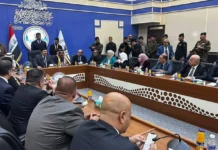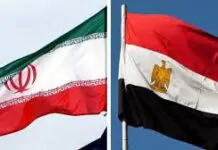Tishwash: Al-Sudani confirms the continuation of banking reform and directs bank managements to simplify procedures..
Prime Minister Mohammed Shia al-Sudani chaired a meeting on Monday with the chairmen of the boards of directors of Iraqi banks. The meeting discussed mechanisms for implementing the banking reform plans prepared by the government as part of comprehensive economic sector reforms.
Al-Sudani said in a statement received by Al-Eqtisad News that “all sectors of the state are linked to the existence of an effective and flexible banking system that relies on modern technologies.” He pointed out that the government has adopted comprehensive plans for banking reform and contracting with private financial auditing companies, which include all banks, and has made great strides in implementation.
He indicated that the work of the First Rafidain Bank will be launched with a new look and vision, and in partnership with specialized and well-known banks.
He pointed to “the formulation of a clear roadmap to address the situation of the private banking sector, as a partner in development,” stressing the need for cooperation during the next phase to take effective steps in reforming the economy. He emphasized the state’s distancing from detailed intervention in sectors and adopting the role of a regulator, indicating the need to work on intervening in all mega projects, as well as supporting local productive sectors, and absorbing the imported cash flow in providing domestic goods and services to citizens to be an alternative to imports, and to ensure support for local investment.
The Prime Minister directed banks to “simplify procedures, participate broadly in the development process, participate as investors in all available opportunities, move toward partnerships with foreign companies, and work to build trust with citizens, which will help ensure they feel secure depositing their money in banks.”
For their part, the heads of the Iraqi banks’ boards thanked the government for its “support for the banks and its assistance in solving their problems, and they confirmed the rise in credit and financial accreditation indicators.
They also pointed to the rise in trading via electronic payment from (1.7) trillion dinars in 2020, to reach (21) trillion dinars in 2024, and they confirmed the readiness to localize the salaries of private sector workers, and their commitment to restructuring Iraqi banks and the (Oliver Wyman) plan, as it will be a comprehensive solution to most of the problems that the banking sector suffers from.” link
************
Tishwash: The National Bank of Iraq: A leadership based on governance and transparency
The National Bank of Iraq affirmed on Tuesday its commitment to the principles of governance and transparency as a fundamental rule governing its financial transactions, adhering to strict standards. It identified what it described as the “most valuable currency” in this vital sector, while pledging to consistently comply with legal and regulatory requirements and international standards.
In a statement received by Al-Eqtisad News, the bank stated, “The National Bank of Iraq’s commitment to the principles of governance and transparency is one of its most prominent factors in the Iraqi banking sector. These principles form the fundamental foundation upon which the bank builds its strong relationships with clients, partners, and various stakeholders, and have contributed to enhancing its credibility in all its financial transactions.”
He added, “Over the years of its operation in the Iraqi market, the National Bank of Iraq has proven that it is not just a financial institution, but a strategic partner for its clients and a loyal guardian of their savings and financial future.” He expressed his belief that “trust is the most valuable currency in this vital sector, and this commitment is an integrated approach to work that is embodied in the finest details of its operations and services, and bears fruit in the form of quality and distinction, thereby strengthening its leading position in the market.”
He explained that “this commitment is clearly demonstrated by the bank’s ongoing efforts to ensure that financial operations are managed in accordance with international best practices, setting strict standards to ensure transparency and accountability in all its transactions.” He explained that “clear examples of this approach include the bank’s ISO 9001:2015 certification in the areas of customer care services and bank transfer operations, confirming that the bank implements an integrated quality management system, with a focus on providing an exceptional banking experience for its customers, based on efficiency, reliability, and attention to the smallest details.”
He explained that “the bank’s commitment to quality and continuous improvement did not come out of nowhere, but rather is the result of a strategic vision that places the customer at the heart of its concerns. Implementing ISO 9001:2015 standards has had a positive impact on the smoothness of internal operations, contributed to raising efficiency and effectiveness, reducing errors, and lowering operating costs. Most importantly, it has strengthened the bank’s ability to comply with legal and regulatory requirements, and opened up broader horizons for cooperation and partnership with global financial institutions, benefiting from international recognition of its quality and reliability.”
He continued, “In the context of this relentless pursuit of excellence, the bank’s efforts culminated in receiving the ‘Excellence Award’ from Citi Bank, in recognition of its superior performance in managing incoming and outgoing financial transfers. This clearly reflects its proficiency in implementing precise and organized procedures that ensure full compliance with international standards in the execution of financial transactions.”
He continued, “The National Bank of Iraq’s continued focus on the principles of good governance and transparency as an integral part of its long-term strategy is supported by the development of its internal systems and the adoption of the latest technologies in the financial sector to enhance the levels of security, speed, and reliability of its banking services.”
The bank reiterated its “commitment to providing innovative banking services that meet the changing needs of its customers and enhance their confidence by offering integrated financial solutions that support individuals and businesses alike, while adhering to global best practices.”
The bank affirmed its “goal to be the first choice for all customers seeking trust, reliability, and excellence in banking services.” link
************
Tishwash: Rafidain Bank in a new look: Al-Sudani announces a new banking era in Iraq
Prime Minister Mohammed Shia al-Sudani confirmed on Monday that the government has adopted comprehensive plans for banking reform and contracting with private financial auditing firms, covering all banks. He also indicated that the work of the First Rafidain Bank will be launched with a new look and vision, and in partnership with specialized and well-known banks.
A statement from the Prime Minister’s Office, received by Shafaq News Agency, stated that “Al-Sudani chaired a meeting of the heads of the boards of directors of Iraqi banks, during which the mechanisms for implementing the banking reform plans prepared by the government as part of comprehensive reforms of the economic sector were discussed.”
Al-Sudani stressed, according to the statement, that “all state sectors are linked to the existence of an effective and flexible banking system that relies on modern technologies,” noting that “the government has adopted comprehensive plans for banking reform and contracted with private financial auditing companies, covering all banks, and has made great strides in implementation.” He indicated that “the work of the First Rafidain Bank will be launched with a new look and vision, and in partnership with specialized and well-known banks.”
He pointed to “the formulation of a clear roadmap to address the situation of the private banking sector, as a partner in development,” stressing “the need for cooperation during the next phase to take effective steps to reform the economy,” and affirming “the state’s distancing from detailed intervention in sectors and assuming the role of regulator.”
Al-Sudani pointed to “working to integrate the private sector and foreign companies in all major projects, as well as supporting local productive sectors and absorbing the imported cash flow into providing domestic goods and services to citizens as an alternative to imports and ensuring support for local investment.”
The Prime Minister directed banks to “simplify procedures, participate broadly in the development process, participate as investors in all available opportunities, move toward partnerships with foreign companies, and work to build trust with citizens, which will help ensure they feel secure depositing their money in banks.”
For their part, the heads of the Iraqi banks’ boards thanked the government for its support to the banks and its assistance in solving their problems. They confirmed the rise in credit and financial accreditation indicators, and pointed out the rise in trading via electronic payment from (1.7) trillion dinars in 2020 to reach (21) trillion dinars in 2024. They confirmed their readiness to localize the salaries of private sector workers and their commitment to restructuring Iraqi banks and the (Oliver Wyman) plan, as it will be a comprehensive solution to most of the problems that the banking sector suffers from, according to the government statement. link





